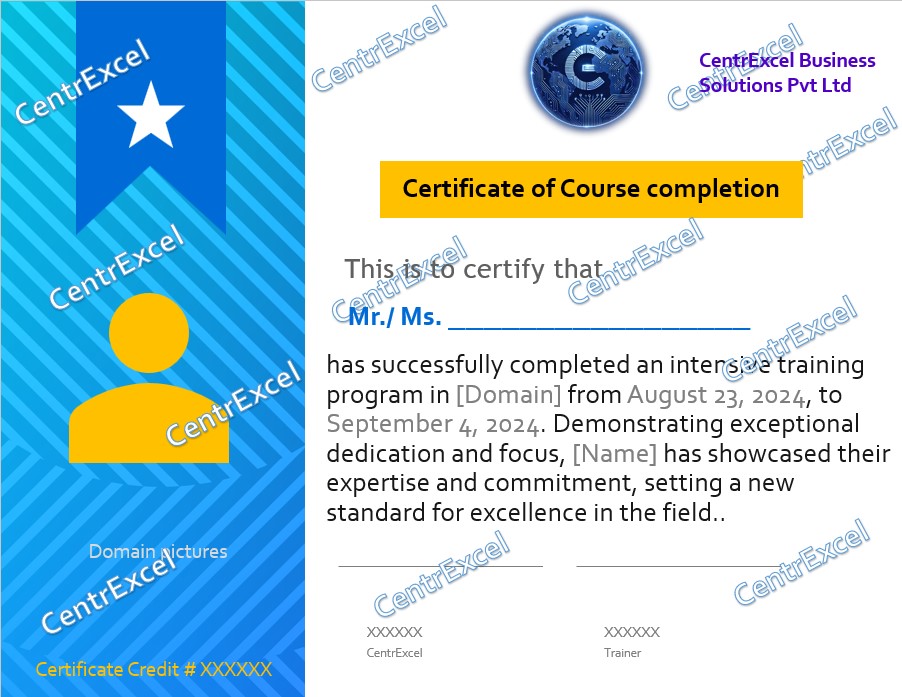Applied Data Science
Applied Data Science
Artificial Intelligence (AI) and Machine Learning (ML) are transformative technologies that enable computers to perform tasks that typically require human intelligence. AI encompasses a wide range of techniques, including natural language processing, computer vision, and robotics, to simulate human-like decision-making. Machine Learning, a subset of AI, focuses on developing algorithms that allow systems to learn from data and improve their performance over time. In a job-oriented training program, participants will gain hands-on experience with popular ML frameworks such as TensorFlow and PyTorch, and learn to build predictive models and data-driven applications. Understanding key concepts such as supervised, unsupervised, and reinforcement learning is essential for tackling real-world problems. Participants will also explore data preprocessing, feature engineering, and model evaluation techniques. AI and ML are increasingly integrated into various industries, including healthcare, finance, and marketing, creating high demand for skilled professionals. The training program will emphasize practical projects and case studies to reinforce learning. By mastering AI and ML, participants will be well-equipped to pursue careers in data science, AI development, and analytics. Overall, this training program aims to bridge the gap between theory and practice, preparing individuals for successful careers in the fast-evolving field of AI and ML.
Artificial Intelligence and Machine Learning Training Program Curriculum
Week 1: Introduction to AI and ML
-
Day 1: Orientation
- Overview of the training program and its structure.
- Introduction to AI and ML: concepts, history, and applications.
-
Day 2: Key Concepts in AI
- Understanding the difference between AI, ML, and Deep Learning.
- Types of AI: Narrow AI vs. General AI.
-
Day 3: Introduction to Machine Learning
- Overview of ML types: supervised, unsupervised, and reinforcement learning.
- Introduction to key ML algorithms.
-
Day 4: Python for AI and ML
- Setting up the Python environment (Anaconda, Jupyter Notebook).
- Introduction to Python libraries: NumPy, Pandas, and Matplotlib.
-
Day 5: Data Handling and Preprocessing
- Data collection, cleaning, and preprocessing techniques.
- Handling missing data and outlier detection.
Week 2: Supervised Learning
-
Day 6: Regression Techniques
- Introduction to linear regression and polynomial regression.
- Implementation using Scikit-Learn.
-
Day 7: Classification Techniques
- Understanding logistic regression and support vector machines (SVM).
- Hands-on practice with classification algorithms.
-
Day 8: Decision Trees and Random Forests
- Introduction to decision trees and ensemble methods.
- Implementing Random Forests for classification tasks.
-
Day 9: Model Evaluation and Validation
- Techniques for model evaluation: confusion matrix, accuracy, precision, recall, F1 score.
- Cross-validation techniques.
-
Day 10: Mid-Program Review
- Review of concepts learned so far.
- Feedback session with trainers and peers.
Week 3: Unsupervised Learning and Clustering
-
Day 11: Clustering Techniques
- Introduction to clustering algorithms: K-means and hierarchical clustering.
- Hands-on implementation of clustering techniques.
-
Day 12: Dimensionality Reduction
- Understanding PCA (Principal Component Analysis) and its applications.
- Implementing PCA using Python.
-
Day 13: Anomaly Detection
- Techniques for anomaly detection in data.
- Practical examples using real datasets.
-
Day 14: Introduction to Neural Networks
- Overview of neural networks and their architecture.
- Activation functions and loss functions.
-
Day 15: Hands-on Project (Unsupervised Learning)
- Project work using clustering and dimensionality reduction techniques.
- Presentation of findings and results.
Week 4: Deep Learning Fundamentals
-
Day 16: Introduction to Deep Learning
- Understanding the difference between traditional ML and Deep Learning.
- Overview of deep learning frameworks (TensorFlow, Keras).
-
Day 17: Building Neural Networks with Keras
- Creating simple feedforward neural networks.
- Implementing multi-layer perceptrons (MLPs).
-
Day 18: Convolutional Neural Networks (CNNs)
- Understanding CNN architecture and its applications in image processing.
- Building and training CNN models using Keras.
-
Day 19: Recurrent Neural Networks (RNNs)
- Introduction to RNNs and LSTM (Long Short-Term Memory) networks.
- Practical implementation of RNNs for sequence prediction.
-
Day 20: Industry Applications of Deep Learning
- Exploring case studies and applications in various domains (healthcare, finance, etc.).
- Guest lecture by an industry expert.
Week 5: Natural Language Processing (NLP)
-
Day 21: Introduction to NLP
- Overview of NLP concepts and applications.
- Text preprocessing techniques: tokenization, stemming, and lemmatization.
-
Day 22: Text Classification
- Implementing text classification using bag-of-words and TF-IDF.
- Building a sentiment analysis model.
-
Day 23: Word Embeddings and Language Models
- Understanding word embeddings (Word2Vec, GloVe).
- Introduction to transformer models (BERT, GPT).
-
Day 24: NLP Project
- Hands-on project focusing on a real-world NLP problem.
- Presentation of project results and findings.
-
Day 25: Mid-Program Review
- Review of concepts learned in AI and ML so far.
- Feedback session with trainers and peers.
Week 6: Advanced Topics in AI and ML
-
Day 26: Reinforcement Learning
- Introduction to reinforcement learning concepts and algorithms.
- Understanding Q-learning and policy gradients.
-
Day 27: Model Deployment
- Techniques for deploying machine learning models in production.
- Introduction to Flask for creating APIs.
-
Day 28: Introduction to MLOps
- Understanding MLOps principles and best practices.
- Versioning and monitoring of machine learning models.
-
Day 29: Ethical Considerations in AI
- Discussion on ethical issues related to AI and ML.
- Exploring bias in algorithms and responsible AI practices.
-
Day 30: Final Project Planning
- Selecting a final project topic for implementation.
- Defining project objectives and deliverables.
Week 7: Final Project Development
-
Day 31: Project Development
- Working on the final project using learned AI and ML techniques.
- Implementing data preprocessing and model building.
-
Day 32: Model Training and Evaluation
- Training the model and evaluating its performance.
- Making necessary adjustments based on evaluation metrics.
-
Day 33: Finalizing the Project
- Completing the project and preparing for the presentation.
- Writing documentation for the project.
-
Day 34: Project Presentation Preparation
- Preparing slides and materials for the final presentation.
- Practicing presentation skills.
-
Day 35: Final Project Presentations
- Presenting final projects to trainers and peers.
- Receiving feedback and discussing key takeaways.
Week 8: Career Development and Industry Trends
-
Day 36: Career Development Workshop
- Resume building and interview preparation for AI/ML roles.
- Networking tips and job search strategies.
-
Day 37: Industry Trends in AI and ML
- Discussing current trends and future directions in AI and ML.
- Guest lecture by an industry expert.
-
Day 38: Continuous Learning in AI and ML
- Resources for further learning and development in AI and ML.
- Discussion on relevant certifications and online courses.
-
Day 39: Program Review and Feedback
- Final review of the training experience.
- Feedback session with trainers and peers.
-
Day 40: Certification Distribution
- Distribution of certificates for program completion.
- Discussion on next steps in career paths.
Additional Components
- Hands-on Projects: Throughout the program, participants will work on hands-on projects to reinforce learning and practical skills.
- Mentorship: Each participant will be assigned a mentor to provide guidance, support, and feedback throughout the program.
- Collaboration: Encourage collaboration on projects to enhance teamwork skills and knowledge sharing.
This curriculum is designed to provide a comprehensive training experience in AI and ML, equipping participants with the necessary skills to succeed in the rapidly evolving tech industry




Add a Review
Our Pricing Plan
Select a Plan According to
Your Requirements
Rs.0000
All Services include:
- Self Assessment
- Recorded Classes
- 8 Hours of Live Sessions
- Problem Solving Sessions
- Certification
- Agile & Scrum Track
- Placement Guidance
- Interview Assistance
Rs.0000
All Services include:
- Self Assessment
- Recorded Classes
- 18 Hours of Live Sessions
- Problem Solving Sessions
- Certification
- Agile & Scrum Track
- Career Coaching
- Trainer / Mentor Support
Rs.85000
All Services include:
- Self Assessment
- Live Sessions
- Problem Solving Sessions
- Certification
- Agile & Scrum Track
- Career Coaching
- Placement Guidance
- Interview Assistance
Copyright | Centrexcel Business Solutions Pvt. Ltd. All Rights Reserved | Designed & Developed by Eliora Technologies Pvt. Ltd.

Reviews
No Reviews Available.